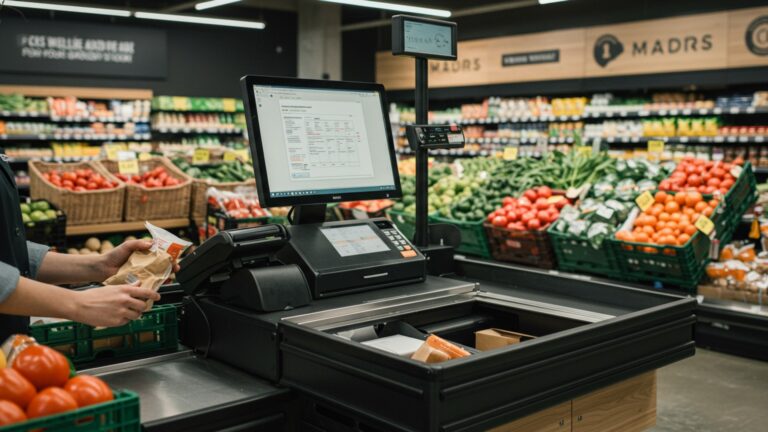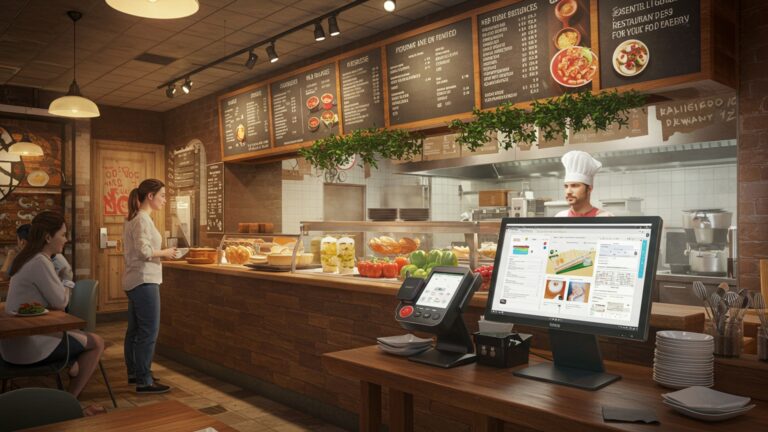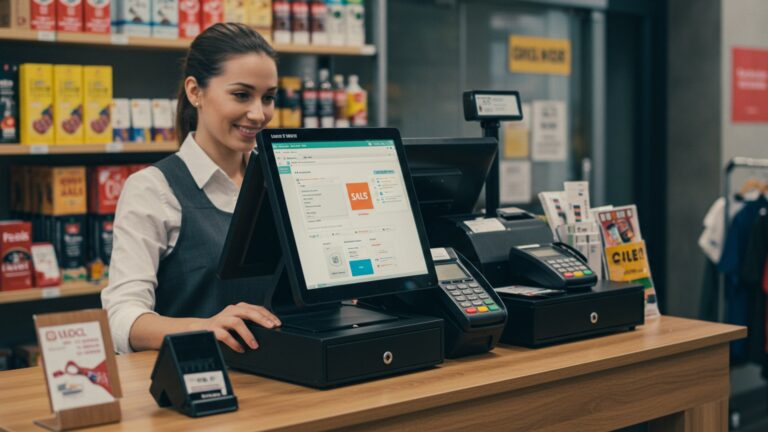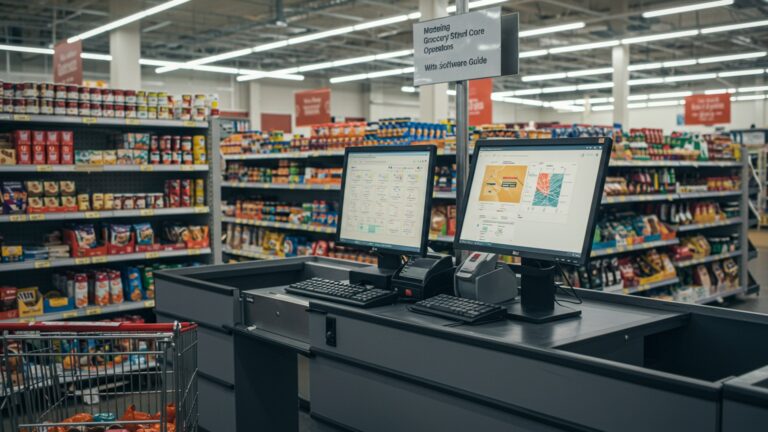How to Choose the Best POS Software in India for Your Business
In India’s rapidly evolving retail and services landscape, a Point of Sale (POS) system transcends mere transaction processing; it is the strategic backbone for modern business operations. With the widespread adoption of digital payment platforms like UPI and the constant need for seamless GST compliance, identifying the best POS software in India is no longer a luxury but a fundamental necessity. Businesses, from small kirana stores leveraging cloud-based inventory to multi-outlet restaurants managing CRM and online orders, demand integrated solutions that offer real-time data, robust analytics. scalable features. Choosing correctly means transforming operational challenges into significant growth opportunities, ensuring agility in a competitive, tech-driven market.
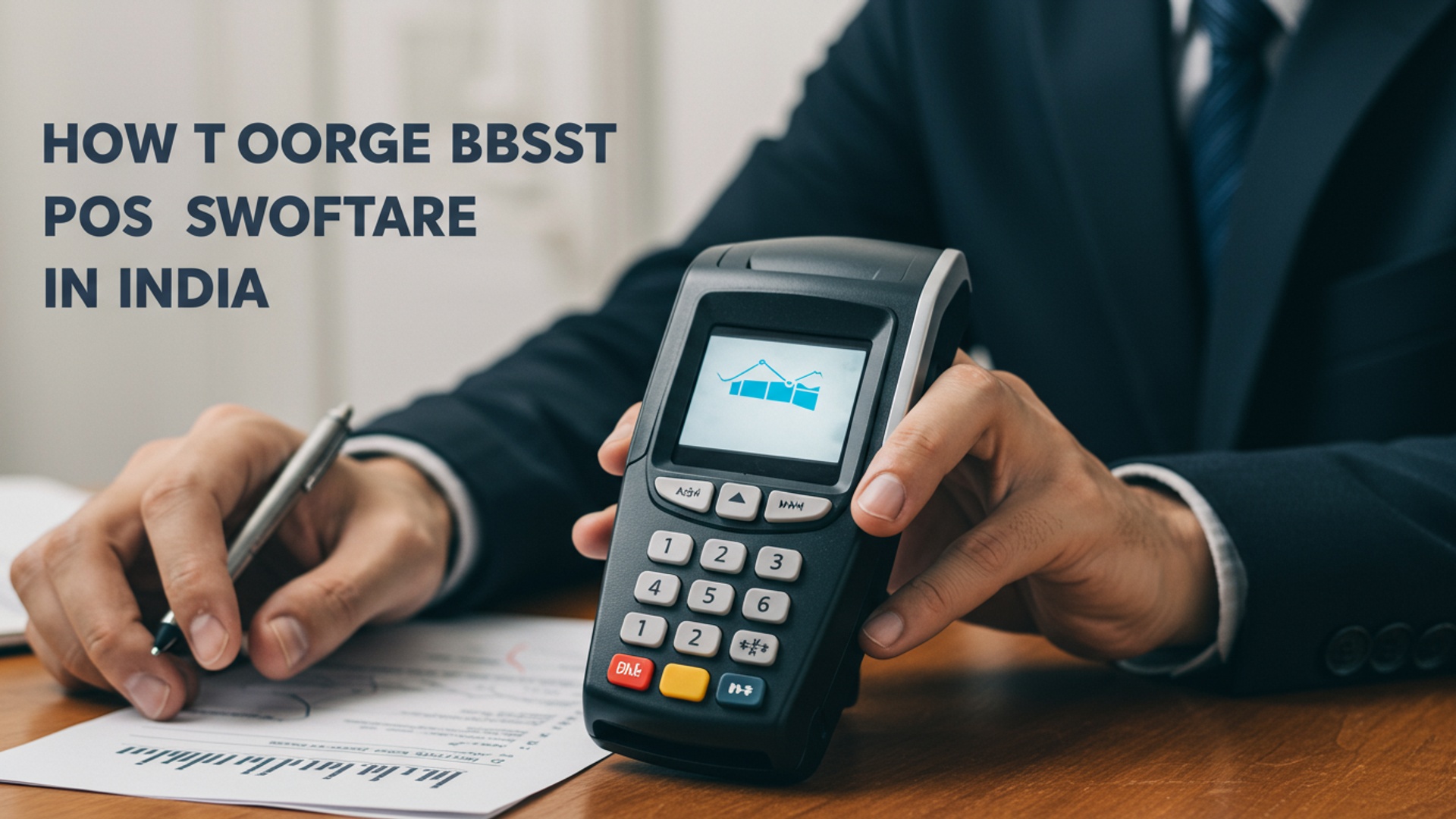
Understanding Point-of-Sale (POS) Software in the Indian Business Landscape
In today’s fast-paced commercial environment, a robust Point-of-Sale (POS) system is no longer a luxury but a necessity for businesses of all sizes. For Indian enterprises, a POS system acts as the central nervous system for sales operations, inventory management, customer relationship building. even staff performance tracking. At its core, POS software is the digital system that processes transactions, whether a customer is paying for a cup of coffee, a new gadget, or a salon service. Beyond simply accepting payments, modern POS solutions streamline various operational aspects, offering invaluable insights and enhancing efficiency.
Consider a retail store in Delhi managing hundreds of SKUs (Stock Keeping Units) across multiple branches. Without an integrated POS, tracking sales, managing inventory levels. understanding customer purchasing patterns would be a monumental, error-prone task. The right POS software automates these processes, reducing manual effort, minimizing discrepancies. providing real-time data that empowers business owners to make informed decisions. It’s about transforming a point of transaction into a point of intelligence.
Essential Features to Look For in the Best POS Software in India
When evaluating the best POS software in India, a comprehensive feature set is paramount. The ideal solution should go beyond basic sales processing to offer a holistic management platform. Here are the critical features to prioritize:
- Sales and Transaction Processing
- Inventory Management
- Customer Relationship Management (CRM)
- Reporting and Analytics
- Employee Management
- Vendor and Purchase Management
- Multi-Store Management
- Offline Mode Capability
- GST Compliance
This is the fundamental capability. Look for intuitive interfaces, quick product look-up, discounts and promotions application, split payments. seamless integration with various payment gateways, including UPI, debit/credit cards. digital wallets, which are crucial in the Indian market.
Effective inventory control is vital for profitability. The software should track stock levels in real-time, manage multiple warehouses/locations, generate purchase orders, handle returns. provide alerts for low stock. This prevents both stockouts and overstocking, which can tie up capital.
Building customer loyalty is key. A good POS system allows you to capture customer data (name, contact, purchase history), manage loyalty programs, offer personalized promotions. track customer engagement. This helps businesses interpret their clientele better and foster repeat business.
Data-driven decisions are powerful. The software should offer detailed reports on sales performance, popular products, peak hours, employee performance. inventory turnover. Customizable dashboards and actionable insights help identify trends and areas for improvement.
Track employee sales performance, manage shifts, assign roles and permissions. even calculate commissions. This streamlines HR operations and helps in performance evaluation.
Manage supplier data, track purchase orders. reconcile invoices. This ensures a smooth supply chain and better cost control.
For businesses with multiple outlets, the ability to centrally manage inventory, sales data, pricing. promotions across all locations is indispensable. This ensures consistency and provides a consolidated view of the entire operation.
Given occasional internet connectivity issues in certain parts of India, an offline mode that allows transactions to be processed and then synced once online is a significant advantage.
This is a non-negotiable feature for any business in India. The POS software must be able to generate GST-compliant invoices and reports, simplifying tax filing and ensuring regulatory adherence.
Cloud-based vs. On-premise POS Software: A Comparison for Indian Businesses
The choice between cloud-based and on-premise POS software significantly impacts deployment, cost, accessibility. maintenance. Understanding their differences is crucial for selecting the best POS software in India for your specific needs.
| Feature | Cloud-based POS | On-premise POS |
|---|---|---|
| Definition | Software hosted on the vendor’s servers and accessed via the internet (SaaS model). | Software installed directly on your local servers and computers. |
| Initial Cost | Lower upfront cost (subscription model). | Higher upfront cost (software license, hardware, installation). |
| Maintenance & Updates | Managed by the vendor; automatic updates, minimal IT staff required. | Managed by the business; requires dedicated IT staff or external support. |
| Accessibility | Access from anywhere, on any device with internet. Ideal for remote management. | Access typically limited to the local network; remote access requires additional setup. |
| Data Security | Vendor responsible for security, often with robust measures and backups. | Business responsible for security, requiring in-house expertise and infrastructure. |
| Scalability | Easily scalable; add or remove users/locations as needed with subscription tiers. | Scaling requires additional hardware and software licenses, more complex. |
| Offline Capability | Many modern cloud POS offer an offline mode for continued operation. | Naturally operates offline as it’s locally installed. |
| Internet Dependency | Requires stable internet for full functionality, though offline modes mitigate this. | Less dependent on internet for core operations. updates/syncs may require it. |
For many small to medium-sized businesses (SMBs) in India, cloud-based solutions are often the best POS software in India due to their lower initial investment, ease of maintenance. accessibility. But, larger enterprises with specific data security requirements or areas with consistently poor internet connectivity might still lean towards on-premise solutions.
Industry-Specific POS Solutions: Tailoring to Your Business Needs
While core POS functionalities remain consistent, the best POS software in India often comes with industry-specific customizations. A generic solution might not adequately address the unique workflows and challenges of different business sectors.
- Retail POS
- Restaurant POS (Restaurant Management System – RMS)
- Salon/Spa POS
- Grocery Store POS
A retail POS needs robust inventory management with features like barcode scanning, SKU tracking, variant management (size, color), promotions and discount engines. customer loyalty programs. For example, a clothing boutique in Mumbai needs to manage different sizes and colors of the same garment, while an electronics store requires serial number tracking and warranty management.
Often includes table management, kitchen display systems (KDS), order customization, menu management with modifiers, split billing, online ordering integration. reservation management. A cafe in Bangalore, for instance, might need quick order processing for takeaway, while a fine-dining restaurant requires detailed table layouts and course management.
Typically features appointment scheduling, staff commission tracking, client history (services, preferences), package management. resource booking (e. g. , specific treatment rooms). A salon in Chennai would benefit from automated appointment reminders and stylist performance tracking.
Requires rapid checkout, extensive inventory management for perishable goods, weight-based pricing, vendor management. potentially integration with loyalty cards and home delivery services.
Choosing an industry-specific solution ensures that the software is pre-configured with the tools and workflows most relevant to your business, minimizing customization efforts and maximizing operational efficiency.
Scalability and Integration Capabilities
As your business grows, your POS system should be able to grow with it. Scalability is a key factor when considering the best POS software in India. Can the system handle increased transaction volumes, additional users, new locations, or an expanded product catalog without performance degradation or requiring a complete overhaul?
Equally vital is the ability of the POS software to integrate with other essential business tools. A truly powerful POS ecosystem extends beyond just sales and inventory. Look for integrations with:
- Accounting Software
- E-commerce Platforms
- Payment Gateways
- CRM Systems
- Loyalty Programs
Seamlessly sync sales data, expenses. inventory values with popular accounting platforms like Tally, Zoho Books, or QuickBooks. This reduces manual data entry and ensures accurate financial reporting.
If you operate an online store (e. g. , Shopify, WooCommerce), integration allows for unified inventory management and customer data across both online and offline channels. This is critical for omnichannel retail strategies.
Integration with various payment processors (e. g. , PayU, Razorpay, Paytm, UPI aggregators) is essential for offering diverse payment options to Indian customers.
Deeper CRM integrations can provide a more comprehensive view of customer interactions across all touchpoints.
Integrate with third-party loyalty platforms if the built-in CRM is not sufficient.
A lack of integration can lead to data silos, manual reconciliation. inefficiencies. For example, a retail chain that adopted a new POS system but overlooked its accounting integration found itself spending an extra 10-15 hours per week manually transferring sales data to their accounting software. This negated many of the efficiency gains from the new POS.
Cost Considerations and Return on Investment (ROI)
The total cost of ownership (TCO) for POS software involves more than just the sticker price. When evaluating the best POS software in India, consider the following cost components:
- Software License/Subscription
- Hardware Costs
- Installation and Setup
- Training
- Support and Maintenance
- Payment Processing Fees
- Hidden Costs
This is the recurring fee for using the software. Cloud-based solutions typically have monthly or annual subscriptions, while on-premise solutions might involve a one-time license fee.
This includes the POS terminal (PC, tablet, smartphone), barcode scanner, receipt printer, cash drawer. credit card reader.
Costs associated with initial setup, data migration. configuration.
Costs for training staff on how to use the new system.
Ongoing fees for technical support, software updates. bug fixes.
Transaction fees charged by payment gateways.
Be wary of additional fees for specific features, integrations, or exceeding certain transaction limits.
While cost is an crucial factor, focusing solely on the cheapest option can be a false economy. The real value lies in the Return on Investment (ROI). The right POS system can lead to significant savings and revenue growth through:
- Reduced inventory losses due to better tracking.
- Increased sales efficiency and faster checkout times.
- Improved customer loyalty leading to repeat business.
- Better data for strategic decision-making.
- Reduced manual errors and administrative overhead.
- Compliance savings (e. g. , streamlined GST filing).
A small restaurant in Pune invested in a slightly more expensive POS system that offered robust inventory management and online ordering integration. Within six months, they reported a 15% reduction in food waste and a 20% increase in online orders, far outweighing the initial investment.
Support, Training. User-Friendliness
Even the most feature-rich POS system is only as good as its usability and the support behind it. For businesses in India, reliable local support can be a game-changer.
- Customer Support
- Training
- Ease of Use
Evaluate the vendor’s support channels (phone, email, chat), response times. availability (24/7 support is ideal for businesses with extended hours). Localized support, perhaps in regional languages, can be a significant advantage. Ask for testimonials or case studies related to their support services.
How does the vendor facilitate training? Do they offer on-site training, online tutorials, or user manuals? User-friendly software with intuitive interfaces reduces the learning curve for staff, minimizing downtime and errors.
A complex system, no matter how powerful, will lead to frustration and resistance from staff. Look for a clean, logical interface that allows for quick onboarding of new employees. The best POS software in India combines advanced features with simplicity.
// Example of a simple POS transaction flow logic (pseudocode)
FUNCTION ProcessTransaction(items[], customer, paymentMethod) totalAmount = CALCULATE_TOTAL(items) APPLY_DISCOUNTS(totalAmount, customer) IF paymentMethod == "Cash" THEN ACCEPT_CASH(totalAmount) PRINT_RECEIPT() ELSE IF paymentMethod == "Card" THEN INITIATE_CARD_PAYMENT_GATEWAY(totalAmount) WAIT_FOR_APPROVAL() IF APPROVED THEN PRINT_RECEIPT() ELSE DISPLAY_ERROR("Card transaction failed.") RETURN FALSE END IF ELSE IF paymentMethod == "UPI" THEN GENERATE_UPI_QR_CODE(totalAmount) WAIT_FOR_PAYMENT_CONFIRMATION() IF CONFIRMED THEN PRINT_RECEIPT() ELSE DISPLAY_ERROR("UPI payment failed or timed out.") RETURN FALSE END IF END IF UPDATE_INVENTORY(items) UPDATE_CUSTOMER_HISTORY(customer, items) RETURN TRUE
END FUNCTION
This simplified pseudocode illustrates the logical steps a POS system takes, highlighting the need for a robust and user-friendly interface to manage these complex backend processes seamlessly for the cashier.
Security and Compliance: Protecting Your Business and Customers
In an age of increasing cyber threats, data security and compliance are paramount. The best POS software in India must offer robust security features to protect both your business’s sensitive data and your customers’ payment details.
- Data Encryption
- PCI DSS Compliance
- Access Control
- Regular Backups
- Indian Regulatory Compliance
Ensure all sensitive data, especially payment data, is encrypted both in transit and at rest.
If your business processes credit card payments, verify that the POS system and its integrated payment gateway are PCI DSS (Payment Card Industry Data Security Standard) compliant. This is a global standard for handling cardholder data securely.
The system should allow for granular user permissions, ensuring that employees only have access to the functionalities relevant to their roles.
Cloud-based systems typically handle backups automatically. for on-premise solutions, you need a clear backup strategy.
Beyond GST, ensure the software adheres to other relevant Indian regulations, especially concerning data privacy and financial transactions.
Neglecting security can lead to data breaches, financial losses. severe damage to your business reputation. A restaurant chain faced a significant challenge when their outdated POS system was compromised, leading to customer credit card details being stolen. This incident resulted in hefty fines, loss of customer trust. a costly migration to a more secure, compliant POS solution.
Conclusion
Choosing the ideal POS software in India is less about finding a one-size-fits-all solution and more about strategic alignment with your unique business needs. As I’ve learned from countless businesses, from a small boutique in Bandra to a growing cafe chain in Bengaluru, the right choice empowers, while a hasty one can cripple. Focus on features like seamless UPI integration, robust inventory management tailored for Indian supply chains. excellent local support. My personal tip? Always insist on a free trial to truly test its real-world performance, especially concerning peak hour load management and GST compliance specific to your business model. Embrace the current trend towards cloud-based and mobile POS solutions, as they offer the flexibility and scalability crucial for today’s dynamic Indian market. Remember, this isn’t merely a software purchase; it’s an investment in your business’s operational efficiency, customer experience. future growth. Make an informed decision. watch your business thrive.
More Articles
Best Billing Software in India: Complete Guide for 2025
A Complete Guide How to interpret and Use Essential POS Software Features
Future Proof Your Business How to Leverage Cloud Based POS Software Benefits
Unleash Business Mobility How to Implement Mobile POS Software Solutions Seamlessly
Simplify Your Transactions How to Master POS Billing Software for Accuracy
FAQs
What exactly is POS software and why is it crucial for my Indian business?
POS (Point of Sale) software is essentially the system where your customer makes a payment for products or services. For Indian businesses, it’s crucial because it streamlines sales, manages inventory, tracks customer data. generates reports. This helps you make better decisions, reduce errors. improve customer service, especially with the diverse payment methods common here.
What are the must-have features I should look for in a POS system here in India?
Key features include robust inventory management (stock tracking, reorder alerts), detailed sales reporting, customer relationship management (CRM), multi-payment option support (cash, UPI, cards, wallets), GST compliance. barcode scanning. Depending on your business, features like table management for restaurants or multi-store capabilities might also be essential.
How much should I expect to pay for good POS software in India?
The cost varies widely based on features, vendor. whether it’s a one-time purchase or a subscription. You might find basic cloud-based solutions starting from ₹500-₹1500 per month, while more advanced or on-premise systems could involve a significant upfront investment plus annual maintenance. Always check for hidden costs like setup, training, or additional hardware.
Should I go for a cloud-based or an on-premise POS system?
Cloud-based systems are generally more flexible, accessible from anywhere. often have lower upfront costs with subscription models. They’re great for businesses with multiple locations or those needing remote access. On-premise systems give you full control over your data and software but require local server maintenance and a higher initial investment. Cloud is increasingly popular in India due to ease of use and lower maintenance.
Will the POS software integrate with my other business tools, like accounting?
Integration is super vital! Look for systems that can seamlessly connect with your existing accounting software (like Tally or Zoho Books), e-commerce platforms, or CRM tools. Good integration prevents manual data entry, reduces errors. gives you a holistic view of your business operations. Always ask vendors about their integration capabilities.
What kind of support and training can I expect from the vendor?
Excellent support is non-negotiable. Check if the vendor offers local support, preferably in your language. what their response times are. Ask about initial setup assistance, comprehensive training for your staff. ongoing technical support (phone, email, chat). Reliable support ensures minimal downtime and smooth operations.
How do I make the final decision among all the choices available?
Start by listing your business’s specific needs and budget. Research multiple vendors, read reviews. ask for demos. Pay close attention to user-friendliness, scalability. the vendor’s reputation. Don’t hesitate to contact other businesses using their system for feedback. A trial period, if offered, can be very helpful before committing.

